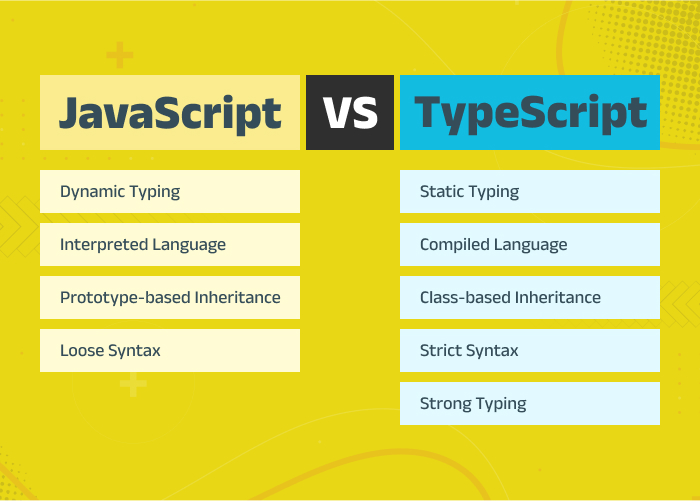TypeScript vs JavaScript – Difference

Typescript is a programming language used for creating complex applications following OOP principles and where typing is optional whereas JavaScript is used to create web pages which is quite similar to C++. Both are programming languages with some key differences.
JavaScript:
- Dynamic Typing: JavaScript is a dynamically typed programming language. Thus, there is no need to specify a variable’s data type while declaring.
- Interpreted Language: JavaScript code can be easily run directly in the browser. Web browsers have an interpreter that interprets every single line and runs JavaScript code.
- Prototype-based Inheritance: JavaScript uses prototype-based inheritance, where objects can inherit properties and methods directly from other objects.
- Loose Syntax: JavaScript has a more lenient syntax, which can sometimes lead to unexpected behavior or errors.
TypeScript:
- Static Typing: It has static typing capabilities, making it a statically typed superset of JavaScript.
- Compiled Language: Before being run, the compiler compiles the code into plain JavaScript in order to enable error checks and optimization.
- Class-based Inheritance: It supports class-based inheritance, similar to many other object-oriented programming languages like Java or C#.
- Strict Syntax: It has a stricter syntax compared to JavaScript, which can help catch errors at compile-time rather than runtime.
- Strong Typing: Its strong typing system helps prevent type-related bugs and makes code easier to understand and maintain.
TypeScript vs JavaScript – Disadvantages
The disadvantages of TypeScript are as follows:
- It introduces additional syntax and concepts, such as static typing and interfaces, which may require developers to invest time in learning.
- Before the code can be run in a browser or on a server, it must be compiled into JavaScript.
- It can be difficult to integrate TypeScript into existing JavaScript codebases, particularly if the codebase is big or has little documentation.
- With capabilities like code completion, refactoring, and static analysis, it offers strong tooling support; yet, putting these tools up and customizing them can be challenging, particularly for novices.
The disadvantages of JavaScript are as follows:
- The dynamic type of JavaScript might result in runtime problems that are hard to find in development.
- JavaScript code may behave differently in different web browsers, which can cause compatibility problems. It might take a lot of effort and time to ensure consistent behavior and performance across different browsers.
- When JavaScript applications get more complicated, they might be harder to comprehend, debug, and expand without the right structure and design.
Use of TypeScript for backend development
TypeScript is becoming more and more popular in the Node.js ecosystem for backend development. It is beneficial for larger codebases and teams, as it provides better code documentation and enhances code maintainability.
Compared to JavaScript, TypeScript has greater IDE support, including refactoring tools, code completion, and type checking. Thus, it can lower the probability of bugs and greatly increase developer productivity.
The static type system in TypeScript guarantees uniform handling of data across the program and helps to prevent frequent runtime mistakes. This can result in backend services that are stronger and more dependable, which lowers the possibility of problems with production and downtime.
As a result, many developers and organizations are adopting TypeScript for building backend services, particularly in the Node.js ecosystem where it has gained significant traction.
Conclusion
Thus, in comparison with JavaScript, TypeScript wins if you need to develop complex applications. JavaScript may be used alongside HTML to enhance online sites. Additionally, there are a lot of seasoned engineers who know how to code in JavaScript.
Like JavaScript, TypeScript isn’t supported by every web browser, though. Thus, if you are having trouble deciding between both the programming languages or developing a project, you can contact us.
FAQs
When to use TypeScript vs JavaScript?
Use TypeScript when you’re working on a large or complex codebase that would benefit from stronger type checking and JavaScript when you’re working on smaller projects or prototypes where simplicity and rapid development are more important than type safety.
What is TypeScript vs React?
TypeScript vs React are not directly comparable as they serve different purposes. Microsoft created TypeScript, a programming language that enhances JavaScript with static typing, and React, a JavaScript toolkit for creating user interfaces.
Why would anyone use TypeScript?
People use TypeScript for enhanced code maintainability and scalability, especially for larger projects.
Why TypeScript is better than Python?
It depends on the specific use case and preferences of the developer.
What are the disadvantages of TypeScript?
Increased complexity and learning curve, especially for developers new to static typing is one of the disadvantages of TypeScript.
What to avoid in TypeScript?
You must not avoid ignoring compiler warnings and errors, as they may indicate potential issues in the code.
Is TypeScript worth it for the backend?
Yes, TypeScript can be worth it for backend development, especially for larger or more complex projects.
Ravi Bhojani is the Chief Marketing Officer (CMO) at Alian Software, where he spearheads the company’s marketing strategies and drives its brand presence in the competitive IT services landscape. With over a decade of experience in the technology and marketing sectors, Ravi has consistently demonstrated his ability to blend innovative marketing techniques with deep industry knowledge to deliver outstanding results.